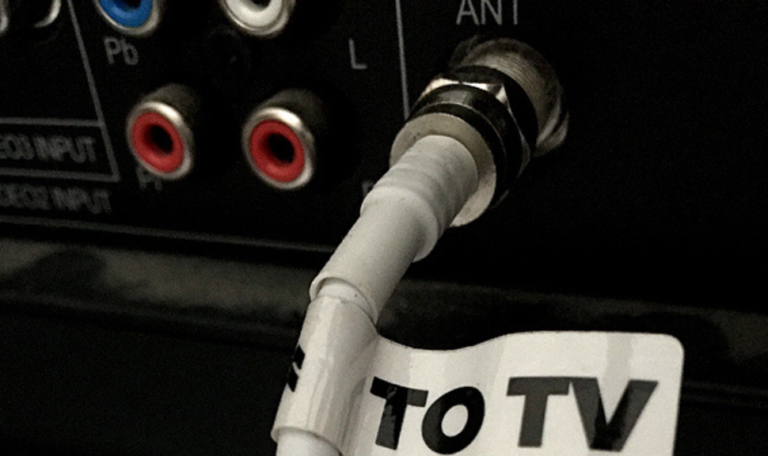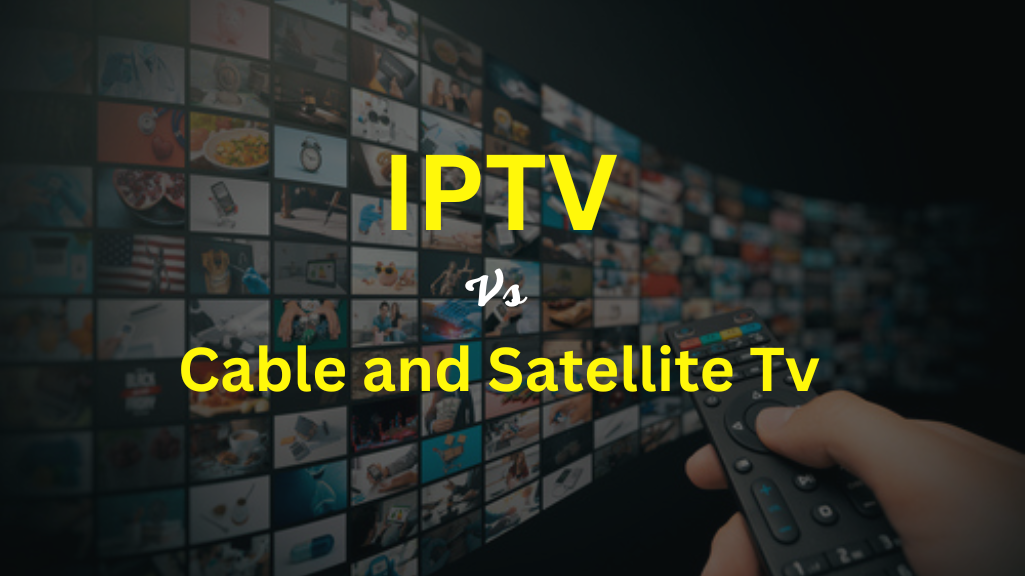Telecasting is a once-in-a-lifetime technological wonder that only a select few viewers were able to witness. The times have certainly evolved… Today, more than ever, viewers have complete access to what content they are watching and what they watch, and when they can watch it! There are nearly the same number of ways to access your favorite TV shows like there are fish on the sea (sort of). With the many options available it’s difficult to be lost among the different TV plans! To shed some clarity on the subject and possibly aiding you in determining the best plan for your requirements, let’s look deep into three of the most well-known choices: IPTV vs Cable as well as Satellite TV.
Traditional Television: Explained
Traditional TV is so embedded into how we live our North American way of living that we rarely question the mechanism behind it. Broadcast networks can be delivered to your house by in one or the other of these ways: satellite or cable. Although they are tuned to signals in different ways, all receive their signal via a central source that determines the broadcast quality.
Cable Television: Up Close and Personal
Cable Television begins its journey through satellite communication systems as radio frequency signals prior to receiving it at your provider’s distribution center. Then, it is converted into light signals before being transferred through fiber-coaxial networks. After completing the road the set-top box decodes the waves and shows the channels you love on your television. Different frequencies on your cable plan allow the user to change between channels and the next without causing interference. Who would have thought that what differentiates your football match from replays from The Titanic are a few glimpses of light!

Cable Television: Advantages
1. Offers high-quality video with minimal buffering
With no interference from the weak frequency of radio, Cable Television offers the most reliable streaming of live broadcasts. The dedicated cable line allows you to enjoy your favorite channels even in the rain and dogs. Plus, no dish required!
2. Pain-free cable TV bundles
Cable TV bundles are useful in that when you combine your television and internet requirements within the same provider’s service and you can be sure that you will not be weighed down with a plethora of bills and have a simple control over all of it.
Cable Television: Disadvantages
1. Restricted Availability
Cable television requires close proximity to the service providers, and may make it nearly impossible to access in rural regions. Do you think about living out in the country? Cable TV might not be the right option for you!
2. Hidden fees
The cable companies can be in a state of confusion when it comes down to the price of their service. They usually conceal the cost of rental and taxes as well as hidden fees associated with subscription packages.
Satellite Television: “Distant” Relative
For all of your broadcasting requirements, satellite television is the best option! In contrast to cabled television it operates wirelessly from one end to the other, and receives the content through radio signals from satellites that orbit. When these signals are received by your own satellite dish, they are then decoded by a set-top box , and converted into TV broadcasts.

Satellite Television: Advantages
1. Availability
Because you can install satellite dishes almost anywhere, satellite TV can reach virtually every area on earth. Remote cabins, faraway cottages remote islands, and isolated cabins These areas will need satellite TV!
2. Price
Satellite TV is usually cheaper than cable, even if it has more HD channels on offer.
Satellite Television: Disadvantages
1. Requires an Outdoor Satellite Dish
While acquiring the dish isn’t too complicated, the installation process is quite a different story! The proper placement of your satellite to get the proper radio waves can be complicated and usually requires the assistance from a professional.
2. Weather
Contrary to stable and stable cable television, this channel is prone to being impacted by weather. Rain, wind, storms or snow: your dish – and consequently the content you love on TV will be vulnerable to weather conditions.
IPTV: Explained
Are IPTV the new television that’s coming? Perhaps. Internet Protocol Television, better called IPTV is a structured paid-subscription service that is offered directly by telecom firms or ISPs. It lets you stream TV shows via Internet Protocol Networks instead of radio waves.
IPTV vs Cable TV
The IP Network communicates datagrams–tiny packets of encoded information–using Internet Protocol to send and receive messages between several computers. Each datagram consists of two parts which are headers and payload. The first functions as the postal service, taking into consideration the sender’s as well as the recipient’s IP address. Second is the day transferred by one machine to another. This is a way to enable internetworking! In general, IPTV vs cable TV is similar to day and night. Both services operate differently and boil down to individual preference.
With IP TV shows, movies, and live television are transformed into a compressed digital format, which is then transmitted through the home Internet connection. If you choose a program to stream within your package of channels on an IPTV provider’s website, your computer taking information from the server of the website by creating a link using the website’s IP address. This lets you access all the necessary information to show the program you’re seeking local news or TV shows, movies … they have all of it!
If you decide to use this kind of service you should make sure you are using the most reliable Internet plan that you can. IPTV lets you watch other shows that aren’t being broadcast on traditional TV by transferring content via your computer to the set-top box. It allows you to control the content you watch and the time you’re capable of watching everything thanks to the capability provided by the Internet.

IPTV In All Shapes and Sizes
Absolutely, IPTV truly has something to offer everyone, whether you want to watch your favorite soapy show or catch the next basketball championship One of the three formats is sure to satisfy your taste.
1. Video on Demand
This distribution method allows you to stream television films and shows without the limitations of traditional broadcasting on a set schedule. The “whatever” as well as “whenever” feature of VOD is the reason why IPTV as well as similar platforms well-liked in this age of mass personalization.
2. Time Shifted Media
This type of IPTV encompasses all life-span limited content that is broadcast following the broadcast was originally scheduled. Didn’t you get to record your favorite program on your old television network? Time Shifted Media is the paradise of delayed watching.
3. IP Simulcasting
IP simulcasting transmits identical datagrams simultaneously to various destinations, which means that people who subscribe on the identical IPTV channel will be receiving the same TV content. This system of distribution of content is typically used to stream games live for thousands of viewers who are synchronous. It is ideal for watching games any time, anyplace, since it lets you enjoy live sports with excellent quality images and minimal buffering.
Although IPTV is similar to more well-known OTT (Over the top stream) streaming platforms like Apple TV and Roku, IPTV makes use of an exclusive, private network that provides a higher quality and more reliable streaming. Goodbye buffering! This is why it could be described as a hybrid between OTT service providers as well as cable television providers.
IPTV: Advantages
1. Interactivity and Fewer Commercial Breaks
In contrast to traditional television, IPTV allows you to interact with your telecasts by rewinding your favorite parts or pausing to for a snack and even eat a snack, all of which are included in the ability to view on demand. Don’t have to go through the hassle of rewinding commercial breaks behind! With your subscription, you have access to the entire broadcasts you desire with less interruptions.
2. Freedom of Distribution
IPTV offers live or pre-recorded content from television to any data network, regardless of whether you connect it to your TV screen or computer. If you subscribe the IPTV service, you’ll be able watch all of your favorite television shows via your mobile, your computer , or using your television connected to the internet.
3. Extensive Sources and Diversity of Televised Content
Discover more content than before thanks to the endless channels and numerous video sources. Apart from regular broadcasts on television, IPTV offers many other channels. Comedy shows that stand up fitness, sports sciences, arts … You can name it, IPTV will most likely provide the channel you need!
4. Relatively Cheaper Than Traditional TV and Customizable Packages
Although the cost is contingent on the channels you select, IPTV is way more economical than traditional TV since it has a variety of diverse content at an affordable price and is easy to install with an set-top box. Furthermore, many IPTV service providers allow you to create your own channels according to your preferences for watching TV. Television “a la carte”, anyone?
5. High Quality Video
As mentioned, IPTV uses a privately managed content delivery network that ensures high-quality streaming with lower buffering and less interruptions than other over-the-top (OTT) service. The servers of your service should instantly download the content onto your screen for a seamless and seamless experience.
IPTV: Disadvantages
1. Relies on Speed and Efficiency of Broadband Internet
To experience enjoying your IPTV service to the maximum you must sign up to a high-quality Internet plan. It is good to know that many Internet Protocol Television companies provide full Internet and TV bundles that guarantee the highest quality streaming.
2. Illegal Streaming
There are many differences between IPTV services. Not all IPTV services are made to be equal. Many providers offer copyrighted or pirated content that could get you in legal troubles. So, it’s essential to select a reliable service for all your TV requirements.
IPTV vs Satellite TV
IPTV against satellite TV is an intriguing rivalry. The hassle of installing satellite dishes is what makes IPTV appear more appealing, however, the choice ultimately is based on personal preference. With the variety of options available it is easy to become lost in the world of IPTV before you find the perfect suitable one. To help you begin your search Here is an overview of secure Canadian companies offering IPTV services:
In Eastern Canada
- Bell Canada Fibe TV
- VMedia
In Western Canada
- SaskTel maxTV
- Telus Optik TV
- Bell MTS Fibe TV
IPTV may not be as well-known as the television services it competes with however; it is evident the rising popularity of VOD and time-shifted media distributors – both an essential part of the IPTV service–on the Canadian market for television. Could IPTV provide the answer for your future TV-watching needs? Tell us in the comments below.


Recent Comments